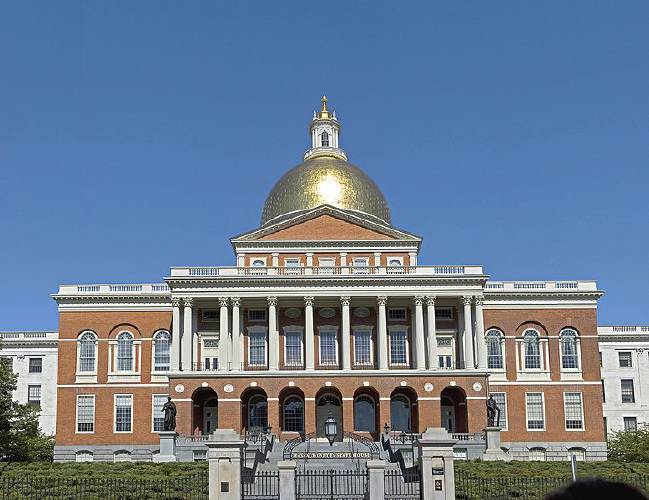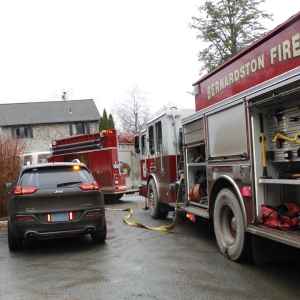Beacon Hill Roll Call: March 24 to March 28, 2025

| Published: 04-04-2025 11:41 AM |
Beacon Hill Roll Call records local senators’ votes on roll calls from recent Senate debate on a fiscal year 2025 supplemental budget that includes $425 million to fund the state’s emergency shelter system and make some changes to tighten eligibility for it. There were no roll calls in the House or Senate last week.
The Senate, 38-0, approved an amendment that would require the governor to create, implement and enforce a safety plan for the state’s emergency shelter system.
“The commonwealth owes it to the families in our emergency shelter program and to the cities and towns that host them to have a comprehensive plan in place to ensure safety and security for all,” said amendment sponsor Sen. Michael Moore, D-Millbury. “After a handful of recent high-profile security failures in our shelters, this amendment would direct the governor’s office to examine rules that create unnecessary risks while setting and maintaining a high standard for safety.”
A “Yes” vote is for the amendment.
Sen. Joanne Comerford — Yes
Sen. Paul Mark — Yes
The Senate, 12-26, rejected an amendment that would expand the background checks that the state must conduct on emergency shelter applicants by mandating universal criminal background checks that include criminal records at the state, federal and international levels, as well as immigration or residency status. Without the amendment, the bill limits background checks to crimes committed in Massachusetts.
“[This amendment] was a bipartisan proposal to ensure that individuals in taxpayer-funded state shelters are not sex offenders and do not have criminal backgrounds in Massachusetts or anywhere else,” said amendment sponsor Sen. Ryan Fattman, R-Sutton. “The amendment would also ensure that the individuals in taxpayer-funded state shelters are U.S. citizens. It’s a commonsense proposal for public safety.
Article continues after...
Yesterday's Most Read Articles
 Two dogs, three cats killed in Orange fire
Two dogs, three cats killed in Orange fire
 Leyden house fire reignites on Monday
Leyden house fire reignites on Monday
 PHOTOS: Hundreds participate in ‘Hands Off!’ standouts across Franklin County
PHOTOS: Hundreds participate in ‘Hands Off!’ standouts across Franklin County
 Plans to move Northfield EMS to Bernardston property fall through
Plans to move Northfield EMS to Bernardston property fall through
 Shelburne Selectboard determines police detective will retain job
Shelburne Selectboard determines police detective will retain job
 Bulletin Board: Greenfield's Savannah Thomas wins Knights of Columbus Hoop Shoot state title
Bulletin Board: Greenfield's Savannah Thomas wins Knights of Columbus Hoop Shoot state title
“We need to put a stop to the dangerous crime in our state shelters,” Fattman continued. “We’ve seen countless cases of unvetted illegal immigrants committing heinous crimes in state shelters, and Gov. Healey is either unwilling or unable to address it. This amendment would have protected vulnerable residents of Massachusetts, who the shelters are intended for, and it’s a shame it did not pass.”
Sen. Mike Rodrigues, D-Westport, said the Senate has already approved an amendment that would require the Executive Office of Housing and Livable Communities, in conjunction with Massachusetts State Police, to study the feasibility of conducting a National Crime Information Center background check for each adult or beneficiary applying for the emergency shelter program. He noted that once the results of the study are released, the Senate, armed with the results of the study, can vote on the broader background checks.
A “No” vote is against broader background checks.
Sen. Joanne Comerford — No
Sen. Paul Mark — No
Gov. Maura Healey signed into law legislation that would extend, until June 2027, the current law that allows cities and towns to offer remote participation at public meetings. The option, first adopted during the COVID-19 pandemic and subsequent state of emergency, was due to expire on March 31. The extension applies to public bodies and representative town meetings.
“This law allows everyone, no matter where they are in our state, to engage in important discussions that affect their lives and makes it easier for everyone to have their voices heard in our government,” Healey said. “We don’t want anyone to be held back from attending public meetings because they don’t have a ride or child care or because they have a disability.”
“As a former mayor, I’ve seen firsthand how local government works better when we have strong public participation,” said Lt. Gov. Kim Driscoll. “Lowering barriers for people to get involved in public meetings will help ensure that local services meet the needs of the community while also inspiring new ideas and making sure people get their questions answered.”
“One of the lessons we learned from the pandemic was that using technology for public meetings expands access and civic participation across government,” said House Speaker Ron Mariano, D-Quincy. “With this extension, we are removing barriers to participation and residents will continue to be able to be active participants in governmental decisions remotely.”
“I have heard loud and clear from my colleagues, and the communities we represent, that hybrid meetings have increased access, engagement and transparency in local government,” said Senate President Karen Spilka, D-Ashland. “There is no reason that a family obligation, a car breakdown, a disability or any other life circumstance should get in the way of making your voice heard on an issue you care about in your community.”
The Healey-Driscoll administration will be distributing an additional $75.8 million in student loan repayment awards to more than 1,700 behavioral health and primary care providers throughout the state as part of the MA Repay Program. Recipients include primary care physicians, family nurse practitioners, physician assistants, psychiatrists, psychologists, social workers, inpatient mental health workers, substance use disorder treatment professionals and school-based mental health providers.
The MA Repay Program is designed to help address the critical shortage of health care professionals in Massachusetts. By offering significant financial relief in the form of student loan repayment, the program incentivizes primary care and behavioral health providers to remain in the field and continue their work in underserved areas across the state. In exchange for a service commitment of four to five years, eligible professionals can receive loan repayment awards ranging from $12,500 to $300,000.
“This is a major investment in Massachusetts’ health care workforce,” Healey said. “By helping to reduce student debt for our dedicated professionals, we are ensuring that we have a strong, diverse and skilled workforce ready to provide quality care for Massachusetts residents.”
“By investing in our behavioral health and primary care providers, we are investing in the health and well-being of communities across Massachusetts,” Driscoll said. “This program will help ensure that residents receive the care they need, when they need it, and that our incredible health care professionals can succeed in the field they love.”
House Speaker Ron Mariano, D-Quincy, said the House will not include in its budget proposal Gov. Healey’s plan to add new taxes on prescription drugs. Mariano told pharmaceutical leaders at MassBio’s “State of Possible” conference that the House would drop this tax idea that Healey included in her $62 billion annual budget bill in January. He also indicated to reporters after his speech that the House would likely not pursue Healey’s idea to apply the state’s sales tax to candy.
Healey’s budget sought a new tax on prescription drug manufacturers for excessive price increases. The Healey administration estimated it could generate $60 million for the state. Her bill would also reestablish a pharmacy assessment on prescription drugs sold in Massachusetts, where pharmacies would be charged 6% per prescription or $2, whichever is less. The estimated $145 million generated from the new charge would have paid for the costly MassHealth program.
“I’m not a doctor … but I subscribe to the Hippocratic Oath,” Mariano said. “I do no harm, first. That’s why in our House budget coming out, we won’t include any taxes on prescription drugs in our budget. That means no arbitrary taxes tied to a drug’s list price, or on our consumers filling prescriptions. We’re concerned about competitiveness and people residing and staying in Massachusetts, and adding $2 to a prescription just based on the fact that you have to have a prescription — it was not something we wanted to do. It’s the wrong message.”
Senate President Karen Spilka, D-Ashland, announced that busts of women’s rights leader and first lady Abigail Adams, as well as freedom fighter Elizabeth Freeman, the first enslaved woman to successfully sue for her freedom in the U.S., will be commissioned and placed in the Massachusetts Senate Chamber. Adams and Freeman will be the first permanent busts depicting women in the Massachusetts State House.
“Whether by accident or design, the contributions of women who have shaped our commonwealth and nation have too long been absent from State House art,” Spilka said. “Today we raise up Abigail Adams and Elizabeth Freeman as trailblazers and leaders who should rightfully be honored in the Senate Chamber. Their presence will help us send a clear message to every woman who walks our halls: you belong here.”
“Representation is not meant to be a crumb,” said Sen. Julian Cyr, D-Truro, chair of the Senate Art Committee. “The decision to place busts of two women in the Senate Chamber is a meaningful testament to the extraordinary contributions of scores of women to our commonwealth. This marks an important step in our ongoing work to recognize the women and individuals who have shaped Massachusetts but have too often been overlooked in our history books.”
Rep. Francisco Paulino, D-Methuen, filed legislation to address the shortage of justices in the Massachusetts Juvenile Court Department by increasing the number from 42 to 80.
“No child should have to wait months or years for justice,” Paulino said. “This bill will help us reduce the backlog, provide timely interventions for at-risk youth and save the commonwealth millions by reducing long-term foster care and detention costs.”
Paulino noted that Massachusetts juvenile courts now handle a broader range of complex cases than when the current cap was enacted decades ago, including child protection, mental health, truancy and emergency custody. He said thousands of cases are impacted annually by judicial delays, with serious consequences for vulnerable children and families.






 ‘Whole campus’ approach: UMass working to help six students whose visas, status were revoked
‘Whole campus’ approach: UMass working to help six students whose visas, status were revoked New England West Skating Club honors those who died in D.C. plane crash
New England West Skating Club honors those who died in D.C. plane crash Deerfield hires new planning and economic development coordinator
Deerfield hires new planning and economic development coordinator
